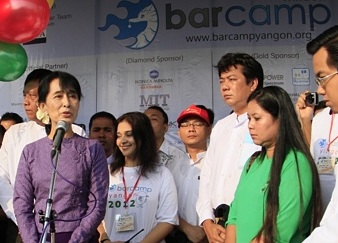Tech4Dem in Myanmar

Times are changing in Burma. The by-elections in April resulted in the NLD winning 43 out of 44 contested seats,removal of the press restrictions that require journalists to submit articles to the Press Scrutiny and Registration Department prior to publication, and the historic visit of President Obama to Myanmar (the first time a sitting president has visited the country).
Access to ICTs in Burma has historically been challenging. Throughout the country, there is low internet and mobile penetration. There were significant cost barriers to gaining access to basic technologies like sim cards (which can cost up to $900), and constant efforts to censor content and strike fear in activists through draconian telecommunications regulations.
This time of change has also reached the technology sector in Burma. The price of sim cards has dropped, the censorship of popular online news outlets such as the Irrawaddy and Mizzima News has been lifted, and use of Facebook has grown incredibly throughout the country.
I had the opportunity to talk with several organizations working on Burma based in Thailand, who expressed that these changes in the operating environment will have significant impacts on how they conduct their work.
Many of these groups have largely focused on a regional or international audience. With the combination of censorship of independent news organizations and pro-democracy groups as well as limitations on technical infrastructure, most organizations focused their communication efforts to reach an English-speaking audience who are viewing content on a higher bandwidth connection on a larger screen. Now, these organizations are looking to maintain both English and Burmese websites, and optimizing content for mobile phone viewers.
Historical lack of access to the global ICT market has resulted in limited technical knowledge across the country (and even more the case among women), and thus has made implementation of online advocacy efforts more challenging. Strengthening the technical knowledge among NGOs is helpful both to gain skills in keeping data safe and facilitating more direct communication between citizens and government. Continuation of events such as Barcamp Yangon (with over 6300 attendees) show promise of the growth of such skills.
The current state of affairs in Burma is complex. However, these steps to open up the media and technology space may help to encourage transparency and dialogue among all stakeholders in Burmese society. As these groups shift from exclusively operating "underground" or outside of the country to establishing a public presence inside Myanmar, grow more comfortable with increasingly more available ICTs, and actions taken to obstruct open accessibility to these technologies, the more able they are to hold government representatives accountable to their statements and actions.
